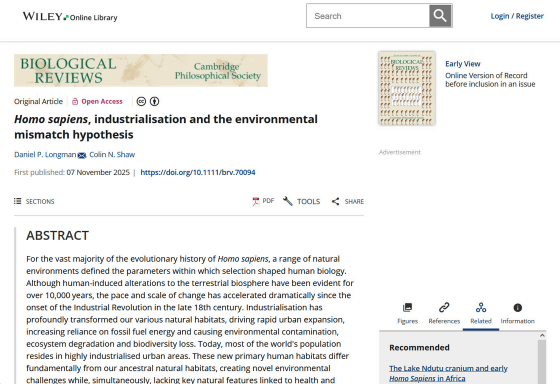Anthropologists claim that modern people's 'daily life of fighting lions' leads to increased stress

Modern people enjoy convenient and enriched lives thanks to various technologies, but at the same time, chronic stress has become a problem. Swiss and British anthropologists have published research results suggesting that the increase in chronic stress in modern people may be due to a 'mismatch between modern society and biological characteristics.'
Homo sapiens, industrialization and the environmental mismatch hypothesis - Longman - Biological Reviews - Wiley Online Library

Into the Woods | | UZH
https://www.news.uzh.ch/en/articles/news/2025/into-the-woods.html
Stressed? Your Body Thinks You're Fighting Lions Every Day, Say Anthropologists : ScienceAlert
https://www.sciencealert.com/stressed-your-body-thinks-youre-fighting-lions-every-day-say-anthropologists
Humans have been modifying their environments for about 10,000 years, but urbanization and industrialization accelerated dramatically with the Industrial Revolution in the 18th century. At the time of writing, an estimated 4.5 billion people, more than half of the world's population, live in urban areas, and this number is expected to reach 6.5 billion by 2050.
Meanwhile, Colin Shaw, an evolutionary anthropologist at the University of Zurich in Switzerland, and Daniel Longman, an evolutionary anthropologist at Loughborough University in the UK, have published research results suggesting that chronic stress may be due to a mismatch between modern society and human biology. They argue that human biology is adapted to living in nature, rather than in densely populated urban environments.
In their paper, the researchers compile evidence suggesting that rapid technological and environmental change is outpacing human biological evolution. For example, modern life, filled with stressors like overflowing inboxes , construction noise , and deadlines , puts our bodies on constant alert—something not seen for much of human history.

'Our ancestors were adept at dealing with acute stress, either to escape or confront predators - this is
The fight-or-flight response was important in the hunter-gatherer era, when humans were trying to survive by releasing the stress hormones adrenaline and cortisol. However, unlike lions, which were only encountered occasionally, in modern humans, where various stressors are almost constant, the fight-or-flight response is constantly on even when it is not necessary.
'The chronic stress caused by busy urban environments may be linked to cognitive decline , autoimmune diseases , and lower birth rates . This, combined with exposure to artificial light , microplastics , and sedentary lifestyles , is damaging health in multiple ways,' Shaw and his colleagues wrote.
'Our bodies react to all of these stressors as if we were lions,' Shaw said. 'Whether it's a difficult conversation with a partner or a boss or traffic noise, our stress response system is pretty much like being faced with lion after lion. The result is a very powerful response from our nervous system that never lets up.'

While it may be difficult to resolve the mismatch between modern society and our biological characteristics, Shaw and his colleagues argue that one solution may lie in 'recognizing nature as a key component of health and protecting and restoring spaces reminiscent of hunter-gatherer times.'
In fact, several studies suggest that contact with nature helps people reduce stress and improve mental health. 'We need to get our cities right and restore natural spaces, recognize their value, and spend more time there,' Shaw said.
Related Posts:
in Free Member, Science, Posted by log1h_ik







